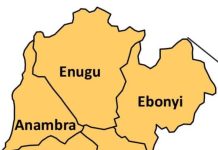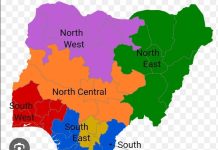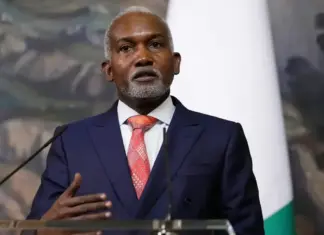

A National Anthem is one of the instruments of modern government. The lyrics are typically approved by the government and people as correctly expressing their history and national aspirations. It normally serves as an embellishment of the national personality to create national pride and endear the nation to the citizens. It is sung at important national, sub-national, sports and school events. It lends importance, credence and solemnity to such events. Citizens sing it standing reverently and respectfully usually with their right palm on their left breast as a sign of meditative communion with the nation. A National Anthem amounts to the music of a national secular faith. The lyrics and music are therefore at the very heart of the nation. Ideally, a National Anthem is a patriotic song aimed at galvanising national patriotism by socialising the citizenry, thus producing patriotic citizens. National Anthems are therefore not mere symbolic national cosmetics, but essential national spiritual instruments for national edification. Even the monarchy-centred British National Anthem which was adopted in September 1745 aimed at the edification of the nation using the monarchy as the rallying point.
National Anthems became very prominent in the 18th century. Claude Joseph Rouget de Lisle wrote the poem of the French National Anthem in 1792. He also composed its music, which was adopted as the French National Anthem on July 14, 1795. It was a war song during the French Revolution. It is no surprise, therefore, that Anne-Marie described it as “bold, catchy and revolutionary.” It is a celebration of French chivalry and the popularisation of the French revolutionary triad of ‘liberty, equality and brotherhood.’ Similarly, the American National Anthem was inspired by the victory over the British at Fort McHenry during the war of 1812. The anthem, “The Star-Spangled Banner” is a song based on the poem “The Defence of Fort McHenry.” No wonder it celebrates what is often described as elements of American character, namely: independence, bravery and heroism in such phrases as ‘land of the free’ and ‘home of the brave.’ It was also Scott Key, the lyricist, who supplied the tune of a popular British song for his poem, which was officially adopted as the American National Anthem in 1931.
The British acquired different parts of Nigeria either as colony or protectorate, by conquest or by treaty and coalesced them into the Colony and Protectorate of Southern Nigeria and Protectorate of Northern Nigeria. In 1914, the two were amalgamated into one country called Nigeria. The name Nigeria was coined by Flora Shaw, the girlfriend of Lieutenant General Frederick Lugard, a boisterous officer, who was deployed to colonial service. After a stint in Uganda in which he introduced indirect rule, he was posted to Nigeria where he effected the amalgamation that was aimed at a colonial-balanced budget rather than the integration of the two halves of Nigeria. He then assumed the title of Governor-General although there were no Governors. In 1959, a year to the date set for Nigeria’s independence from colonial rule, an advert was posted for contestants to produce the National Anthem. Over 500 Nigerians submitted entries but paradoxically the lyric submitted by a British expatriate, Lilian Jean Williams, was selected as the winning entry while the music competition was won by a British ballet musician, Frances Brenda. As one would expect, Ezekiel Mphahlele recorded the criticism of Nigerians that the winners of the National Anthem were both Britons rather than Nigerians. It is contradictory, some people argued, that a very significant document for the independence of Nigeria from Britain was British-brewed. It was therefore not an autochthonous document, which is a serious charge in independence matters as it would appear to detract from the independence of those who claim preparedness and readiness for independence if they could not prepare their own National Anthem. By that date (1959), Nigeria had produced such literary giants like Chinua Achebe who had published the globally successful “Things Fall Apart” and Wole Soyinka who had published and staged many plays including, in fact, the Independence Play, “A Dance of the Forests.” It could not have been that Nigeria which went ahead to produce a Nobel Laureate in Literature and more than 200 entries annually for the Nigerian Prize in Literature could not have produced a winning entry for the National Anthem. As it were, they were Britons who made the statement, “Nigeria We Hail Thee.”
The Anthem was in use from Independence in 1960 till 1978 when the military administration of General Olusegun Obasanjo replaced it with “Arise O Compatriots” which was written by four Nigerians – John A. Ilechukwu, Eme Etim Akpan, Babatunde A. Ogunnaike, O Sola Omoigui, and P. O. Aderibigbe. The music was written by a Nigerian, B. E. Odiase. The second anthem lasted 46 years.
President Ebele Jonathan convened the 2014 National Conference which approved the recommendation of its Committee on Political Restructuring and Forms of Government that Nigeria should revert to the old National Anthem or what some people term the ‘Original National Anthem.’ The conference based its submission on two main grounds. First, it was of the opinion that the old anthem is a better symbol of unity, peace and prosperity without substantiating how it does. Second, the conference argued that the change would assist Nigeria to achieve its goal of building a fully integrated nation. The two grounds sounded good to the ear but are hardly plausible. At best, they are general political platitudes. They also, more or less, form the basis of the adoption of what the Senate President, Godswill Akpabio, termed the “updated National Anthem.” The protagonists argued that “Nigeria We Hail Thee” connects “more to our core with a deeper meaning.” This is still in the realm of generalisations. Candidate Bola Tinubu had promised to revert to the old anthem during his presidential campaign, claiming that it “describes us much better” because “it is about service, commitment and nation-building.”
There is no prescribed amendatory process for a National Anthem because it is not specifically written into the constitution. The change is therefore technically not an amendment to the constitution. It could therefore be handled as a bill which is what was done in this case. Democracy demands a participatory process which normally involves a public hearing. At the public hearing, the Attorney General of the Federation and Minister of Justice, Mr Lateef Fagbemi (SAN) argued that public hearing is necessary but not sufficient for the proposed amendment. For him, “it should be subjected to a wider consultation” to reflect the general wish of Nigerians. The Senate Majority Leader, Opeyemi Bamidele, is quoted to have said, on the same subject, that “if considered necessary, further consultation would be had on the matter.” It turned out that no further consultation was had on the matter. The ‘original anthem’ was therefore brought back without subjecting it to any editing. This is the point of departure for the next section.
The term “updated National Anthem” by Senator Akpabio is not borne out by even the minutest editing of the anthem. It was reproduced completely with the most offensive derogatory line of the lyric which states, “Though tribe and tongue may differ; in brotherhood, we stand.” The derogation is proved by the fact that the term ‘tribe’ is reserved for Africans, Indians and Native Americans and not for peoples in similar circumstances in Europe and the United States. Chinua Achebe in his “Things Fall Apart” had referred to the penchant of colonial officers and European anthropologists for denigrating colonial peoples as tribesmen. We rely on the definitions of two eminent Dictionaries of the English Language to demonstrate discriminatory attribution of the term to Africans and in this particular instance to Nigerians.
The Oxford English Dictionary defines tribe as “an aggregate of people in a primitive and barbarous condition” just as the Century Dictionary defines it as “a division of a barbarous race of people.” To retain this in the National Anthem will be the worst and most unfortunate intentional self-denigration in the twenty-first century. Even worse than that is the fact that the colonial metropolis deliberately applied the word ‘tribe’ as a justificatory phraseology for colonialism and its attendant atrocities. It inflicts a double jeopardy on colonial peoples and neutralises the right of independence. To retain it in the National Anthem is to accept that self-determination is a concession for which Nigerians should show gratitude. Self-determination is a right.
The conjunction ‘Though’ that begins the third line of the anthem suggests that the differences caused by ‘tribe and tongue’ are major obstacles to unity but moderated by brotherhood as a solvent. The role of brotherhood as solvent for the differences between tribe and tongue is counter-intuitive because differences would not have been noticeable and/or worrying if brotherhood is an efficacious solvent in the first place. Even if brotherhood were efficacious, the word brotherhood has become suspect as sexist in matters of this nature. It is better avoided in critical matters like the National Anthem.
In conclusion, we want to put on record the speed with which the ‘original’ anthem was brought back to life. It shows that the National Assembly can speedily attend to issues. In this same spirit, we implore the National Assembly to set in motion the process of expunging the offensive words so as to relieve all Nigerians of the memories of colonialism in our National Anthem. We also want to use this occasion and medium to remind Nigerians that colonialism is alive and well. It comes now in the form of loans, grants, establishment of military posts. In the words of the arch colonialist, Cecil Rhodes, ‘colonialism is philanthropy with 10 per cent.’ It is not only the Greeks that give Greek gifts.
- Izevbaye, Emeritus Professor of English; Adeniran, Professor of Linguistics; and Ayoade, Emeritus Professor of Political Science, write from the University of Ibadan, Nigeria
Join Television Nigerian Whatsapp Now
Join Television Nigerian Facebook Now
Join Television Nigerian Twitter Now
Join Television Nigerian YouTUbe Now





